What is Microsoft .NET?
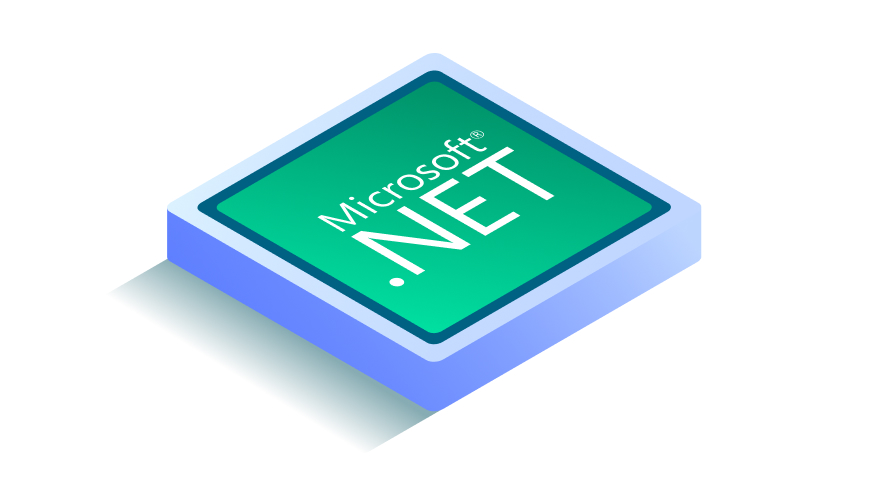
Let's begin to clarify what Microsoft .NET is. Often referred to as .NET, it is a software creation framework from Microsoft that gives a platform to build and run programmes across varying operating systems, tools, and languages. It also provides comprehensive tools, libraries, and runtime environments so developers can produce a range of applications, such as web, desktop, mobile, cloud services etc.
At the core of .NET is the Common Language Runtime (CLR), which provides an execution environment for running applications. The CLR manages memory, handles exceptions and performs various runtime services, ensuring the reliable and efficient execution of .NET programs.
.NET supports multiple programming languages, including C#, Visual Basic .NET (VB.NET), F# and more. Developers can choose their preferred language to write code, as .NET languages are compiled into a common Intermediate Language (IL), which is then executed by the CLR.
The framework consists of different components, such as the .NET Framework (for Windows-based applications), .NET Core (for cross-platform applications) and Xamarin (for mobile app development). These components provide libraries, frameworks and tools that simplify application development, increase productivity and enhance performance.
Overall, Microsoft .NET is a powerful and widely adopted framework that enables developers to create robust, scalable and cross-platform applications efficiently. Its versatility, strong community support and integration with Microsoft's ecosystem make it a popular choice for building a variety of software solutions.
Advantages of using Microsoft .NET
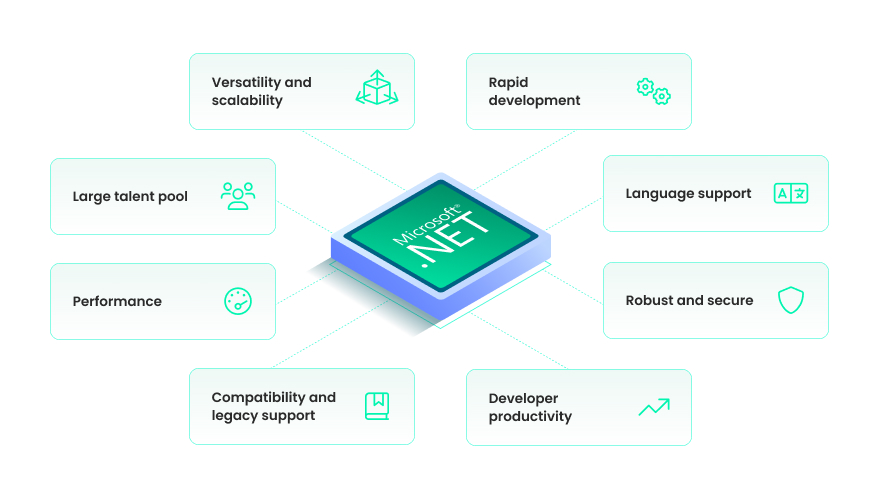
Let's quickly understand what are the main benefits of using Microsoft .NET and the development ecosystem provided by Microsoft.
Versatility and scalability
One of the remarkable advantages of Microsoft .NET is its capability to facilitate cross-platform development across multiple operating systems, including Windows, Linux and macOS. Through the utilization of powerful frameworks such as .NET Core and Xamarin, developers gain the flexibility and convenience to create software solutions that seamlessly function on various platforms, catering to a diverse user base.
Furthermore, the scalability of .NET is a paramount feature that empowers applications to adapt and accommodate growing workloads and user demands proficiently. By leveraging the inherent scalability of the .NET ecosystem, businesses can ensure that their software applications maintain optimal performance and responsiveness, even in the face of increasing usage, data volumes and complex computational tasks.
This scalability aspect proves particularly advantageous in today's rapidly evolving digital landscape, where the ability to handle surges in user traffic and effectively manage resource-intensive operations is essential for sustaining competitiveness and user satisfaction.
Rapid development
Microsoft .NET provides developers with an expansive and comprehensive class library known as the .NET Framework Class Library (FCL). This library stands as a testament to the robustness and depth of the .NET ecosystem, offering a vast array of pre-built code components. These ready-made code components significantly expedite the development process by reducing the time and effort required for writing code from scratch.
One of the prominent advantages of leveraging the .NET Framework Class Library is the potential for code reuse. Developers can take advantage of features like inheritance, interfaces and libraries, enabling them to create efficient and modular code structures.
By employing inheritance, developers can derive new classes from existing ones, inheriting their properties and behaviours, thereby avoiding redundant code and fostering code reusability. Interfaces, on the other hand, provide a powerful mechanism for defining contracts and specifications that classes must adhere to, facilitating code interoperability and extensibility.
Language support
Microsoft .NET offers extensive support for a multitude of programming languages, providing developers with a rich assortment of options to select from based on their individual preferences and proficiency. This expansive ecosystem caters to a diverse range of languages, encompassing popular choices such as C#, VB.NET, F# and a host of others.
By granting developers the freedom to choose the language that aligns best with their coding style and expertise, Microsoft .NET fosters an environment where developers can operate in a manner that is most comfortable and conducive to their productivity.
This incredible versatility of the Microsoft .NET platform extends beyond the provision of various languages. It engenders a sense of harmony and cooperation by facilitating seamless communication and collaboration between teams harbouring different language preferences.
Regardless of the specific language employed within the .NET framework, developers can effortlessly interact, exchange code and harmonize their efforts without encountering significant barriers or incompatibilities. This inherent interoperability obliterates the boundaries created by language-specific silos, empowering teams to merge their diverse expertise and cultivate a unified development process that leverages the unique strengths of each language.
Robust and secure
Within its robust framework, Microsoft .NET presents a highly advantageous feature known as the managed code execution environment.
This sophisticated environment facilitates the automatic management of critical programming elements, including memory, exceptions and garbage collection. By automating these essential tasks, Microsoft .NET effectively mitigates common programming errors, alleviating the burden on developers and enhancing the overall reliability and stability of applications.
Moreover, Microsoft .NET incorporates a comprehensive suite of security measures, designed to fortify applications against unauthorized access and malicious activities. One of these essential security mechanisms is code access security, which regulates the permissions granted to executing code, ensuring that only authorized operations are permitted. This granular control over code execution guarantees that applications maintain robust security protocols, preventing potential exploits and breaches.
In addition to code access security, Microsoft .NET employs robust encryption techniques to safeguard sensitive data and communications. By implementing encryption mechanisms, developers can ensure that information transmitted or stored within their applications remains encrypted and inaccessible to unauthorized entities. This heightened level of security offers peace of mind to both developers and end-users, as it mitigates the risk of data breaches and compromises.
Developer productivity
Microsoft .NET boasts an Integrated Development Environment (IDE) called Visual Studio, renowned for its exceptional capabilities in empowering developers. This robust IDE offers a plethora of comprehensive tools, advanced debugging capabilities and feature-rich code editors, all geared towards enhancing developer productivity and efficiency.
With its intuitive interface and extensive functionality, Visual Studio becomes an indispensable companion for developers working within the .NET framework.
In addition to the powerful IDE, the .NET ecosystem encompasses a vibrant community of developers, creating a fertile ground for knowledge exchange, collaboration, and support. This thriving community serves as a valuable resource for developers, providing a platform to share insights, discuss best practices, and seek assistance when facing challenges. By tapping into the collective wisdom and expertise of this community, developers can accelerate their learning curve, gain new perspectives and discover innovative solutions to complex problems.
Compatibility and legacy support
Another notable advantage of Microsoft .NET is its inherent backward compatibility, ensuring that existing applications can seamlessly transition to newer versions without the need for extensive code modifications.
This backward compatibility feature allows businesses to upgrade their technology stack, leveraging the latest advancements and taking advantage of enhanced functionalities, all while ensuring the smooth operation of their existing software solutions. By minimizing the need for substantial code changes, .NET enables organizations to save valuable time and resources during the upgrade process.
Additionally, Microsoft .NET excels in providing seamless integration with legacy systems and technologies. This capability is particularly valuable for businesses that have invested in long-standing applications or infrastructure, as it allows for the modernization and enhancement of these existing systems.
By integrating with legacy systems, .NET facilitates the gradual transition to newer technologies and frameworks, enabling organizations to maximize the value of their existing investments while incorporating modern functionalities and features. This seamless integration ensures a smooth and efficient migration process, minimizing disruption and reducing the complexity associated with the transformation of legacy applications.
Performance
Performance plays a pivotal role in the resounding success of Microsoft .NET. One of the noteworthy aspects that contribute to its exceptional performance is the implementation of Just-in-Time (JIT) compilation.
This dynamic compilation process occurs at runtime, where the Intermediate Language (IL) code is seamlessly translated into machine code, ensuring optimal performance by minimizing overhead during execution. By effectively eliminating the need for precompilation, JIT compilation enables applications built on .NET to leverage on-the-fly code generation, resulting in enhanced speed and efficiency.
Large talent pool
There's a vast pool of Microsoft .NET developers globally, and several factors contribute to it. .NET's longevity and framework maturity attract experienced professionals. Microsoft's support ensures stability and innovation.
The versatility of .NET appeals to developers seeking diverse project opportunities. Its user-friendly programming model is attractive and the broad job market, extensive documentation and resources further enhance its appeal.
Lastly, .NET Core's cross-platform capabilities expand its reach, attracting developers valuing flexibility. These factors foster a substantial talent pool of .NET developers today.
.NET developers hiring rates and costs
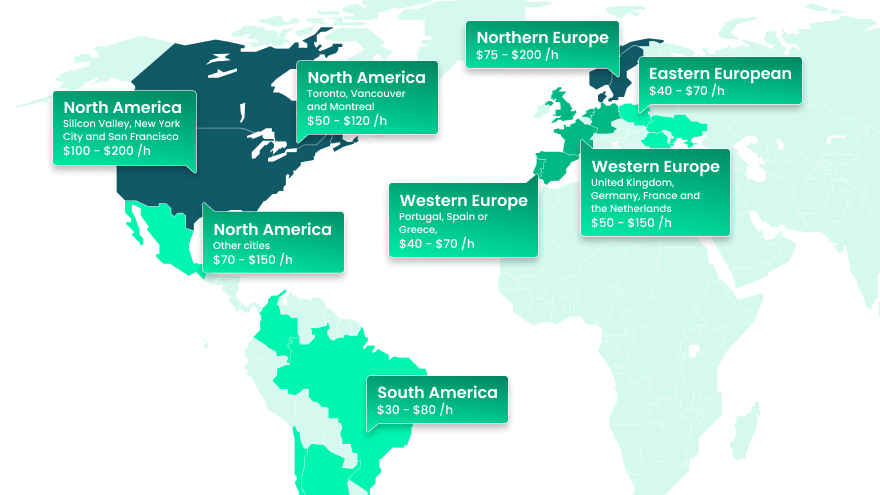
When it comes to hiring a .NET developer, the rates can vary significantly depending on the recruitment location. The rates are subject to regional factors, market demand and the overall cost of living in each specific location.
Therefore, it is crucial to consider these variables when determining the typical rates for hiring a .NET developer. By understanding the nuances of different recruitment locations, businesses can make informed decisions and align their hiring strategies accordingly.
Western Europe
In countries such as the United Kingdom, Germany, France and the Netherlands, .NET developer rates tend to be higher, ranging from $50 to $150 per hour, depending on experience and project complexity. There are of course exceptions, like Portugal, Spain or Greece, where rates usually range between $40 and $70 per hour, depending on the seniority level.
Northern Europe
Countries such as Sweden, Denmark and Norway also have higher rates, ranging from $75 to $200 per hour for skilled .NET developers. Again, the rates change according to the developer's location, experience and seniority level.
Eastern European
Countries like Poland, Ukraine and Romania can be more affordable compared to Western and Northern Europe. Rates typically range from $40 to $70 per hour. These countries offer a great pool of talent and are also very focused on providing skilled talent in software programming and development.
North America
In the United States and Canada .NET developer rates vary across different regions. In major tech hubs like Silicon Valley, New York City and San Francisco, rates can range from $100 to $200 per hour or more. In other cities, rates may range from $70 to $150 per hour. In cities like Toronto, Vancouver and Montreal, .NET developer rates generally range from $50 to $120 per hour, depending on experience and project requirements.
South America
In Mexico, Brazil, Argentina, Colombia, Chile and other South American countries .NET rates usually range between $30 and $80 depending on the country, city and also the developer's experience and seniority level. These are also countries where typically North American companies hire and recruit their development talent.
Other considerations
It is important to consider that these rates are approximate and can vary based on factors such as project complexity, contract type (hourly, monthly, or fixed-price), developer's experience level and the project's specific requirements.
Additionally, rates may change over time due to market dynamics and supply-demand factors. It's always recommended to conduct thorough research and gather localized information to get the most accurate and up-to-date rates for .NET developers in specific regions.
Where to hire .NET developers?
In a very competitive market where is difficult to recruit and retain software development talent, there are plenty of different ways to get access to the talent you require to develop and implement your projects. We share some ideas on where you can find your future software developers.
Freelancer platforms
Websites like Upwork, Freelancer, Toptal, and Guru allow you to post your project requirements and connect with freelance .NET developers. You can review their profiles, portfolios and ratings, and directly engage with them to discuss your project.
Online job sites
Platforms like LinkedIn, Indeed, Glassdoor and Stack Overflow Jobs have extensive job boards where you can post your .NET developer job openings. These platforms also provide search and filtering capabilities to find suitable candidates.
Developer communities and forums
Participating in developer communities and forums, such as GitHub, Reddit and specialized .NET forums can help you connect with .NET developers. Engaging in discussions and posting about your job requirements can attract interested developers.
Tech conferences and meetups
Attend tech conferences, industry events and local meetups focused on software development or Microsoft .NET. These events provide opportunities to meet and network with .NET developers who may be interested in job opportunities.
Development companies and staffing agencies
Partnering with development companies or staffing agencies that specialize in .NET development can provide access to a pool of pre-vetted developers. These companies can assist in finding suitable candidates based on your requirements.
LinkedIn and social media
Use professional networking platforms like LinkedIn to search for .NET developers, join relevant groups and post about job opportunities. You can also leverage social media platforms like Twitter and Facebook to reach out to developers or share job postings.
University and college programs
Connect with local universities or colleges offering computer science or software engineering programs. Many students and recent graduates may be interested in freelance or entry-level .NET developer positions.
Hire .NET developers from an outsourcing provider
When it comes to the recruitment of highly skilled Microsoft .NET developers, another viable and advantageous alternative that businesses can consider is the use of outsourcing companies.
These specialized firms provide valuable resources and expertise in sourcing, screening and selecting top-tier .NET developers who possess the required technical acumen and experience to meet the specific needs of the organization.
By leveraging the services of outsourcing companies, businesses can tap into a vast network of talented professionals, streamline the hiring process and ensure the acquisition of top-notch .NET developers who can contribute effectively to the success of their software development projects.
Advantages of using an outsourcing provider
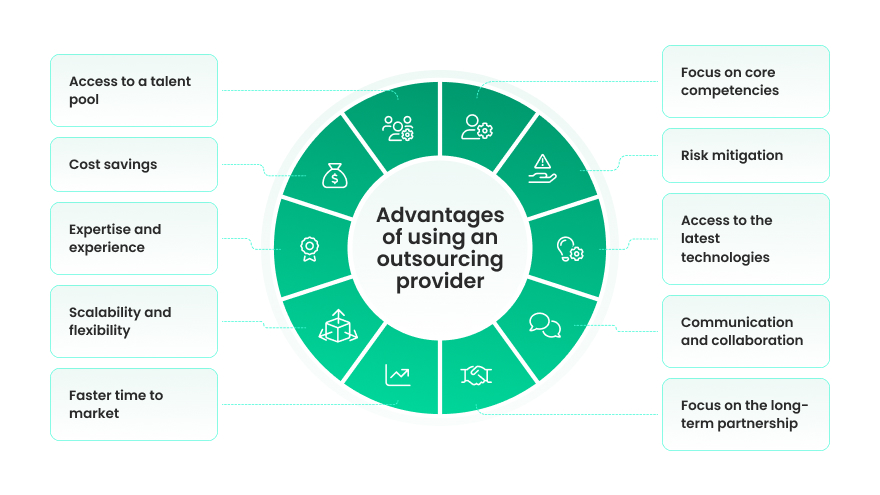
When considering the use of a software development outsourcing provider, it is essential to explore the numerous advantages that come with this strategic decision.
In order to shed light on the subject, we have meticulously compiled a comprehensive list encompassing some of the 10 most noteworthy benefits that emerge from such a collaboration:
- Access to a talent pool: Outsourcing companies often have access to a diverse talent pool of skilled .NET developers. They can quickly match your project requirements with suitable candidates, saving you time and effort in the recruitment process.
- Cost savings: Outsourcing can be cost-effective compared to hiring in-house developers. Outsourcing companies are typically located in regions with lower labour costs, allowing you to access skilled .NET developers at a more affordable rate. You can save on recruitment, onboarding, infrastructure and employee benefits.
- Expertise and experience: Outsourcing companies specialize in software development and often have a team of experienced .NET developers. They can provide you with access to developers who have worked on various projects, gaining valuable expertise and insights that can benefit your project.
- Scalability and flexibility: Outsourcing allows you to scale your development team up or down based on project requirements. Whether you need a single developer or a dedicated team, outsourcing companies can quickly adjust the resources to match your needs, providing flexibility and agility.
- Faster time to market: With an outsourcing company, you can accelerate your development timeline. They typically have established processes, tools and experienced developers who can efficiently handle your project, reducing time-to-market and ensuring timely delivery, as expected.
- Focus on core competencies: By outsourcing your .NET development, you can focus on your core competencies and strategic initiatives. You can allocate more time and resources to areas that directly impact your business while leaving the technical aspects to the outsourcing company.
- Risk mitigation: Outsourcing companies often have well-defined project management processes, quality assurance practices and risk mitigation strategies in place. They can help minimize risks associated with technology, resource availability and project delivery, ensuring a smoother development process.
- Access to the latest technologies: Outsourcing companies stay updated with the latest trends and technologies in the software development industry, including the .NET ecosystem. They can leverage their expertise to recommend and implement the most suitable technologies for your project, keeping you competitive in the market.
- Communication and collaboration: Reputable outsourcing companies prioritize effective communication and collaboration. They provide regular progress updates, maintain transparent communication channels and ensure that you are involved in the decision-making process throughout the project.
- Focus on the long-term partnership: Outsourcing companies aim to build long-term partnerships with their clients. They prioritize customer satisfaction, deliver high-quality results and often offer ongoing support and maintenance services, ensuring the success and sustainability of your Microsoft .NET project.
When choosing an outsourcing company, conduct thorough research, check their track record and evaluate their expertise and capabilities. Clear communication, well-defined expectations and a collaborative approach will contribute to a successful partnership with the outsourcing company and maximize the advantages of hiring .NET developers through them.
What is the difference between nearshore and offshore providers?
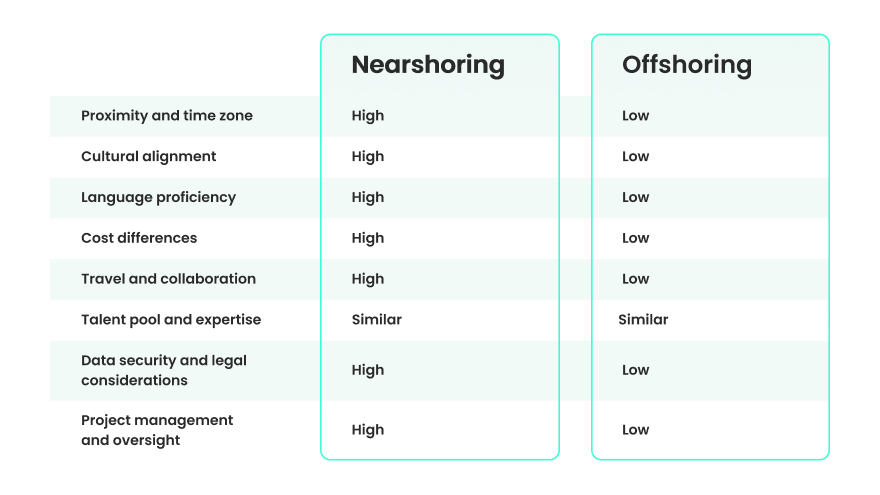
If you use an outsourcing provider to hire Microsoft .NET developers, you will typically end up having to choose between a nearshore provider and an offshore provider. So what are the differences between nearshore and offshore? Here are the 8 main differences to consider, when choosing the best option for you and your company:
- Proximity and time zone: Nearshore outsourcing involves hiring developers from neighbouring countries or regions with a closer geographical and time zone proximity to your location. Offshore outsourcing, on the other hand, involves hiring developers from more distant locations with significant time zone differences. Nearshore outsourcing allows for more accessible communication, collaboration, and coordination due to overlapping working hours.
- Cultural alignment: Nearshore outsourcing often offers a closer cultural alignment and similar work ethics compared to offshore outsourcing. The cultural similarities can facilitate smoother communication and understanding, as well as a better alignment of work practices and business values.
- Language proficiency: Nearshore outsourcing typically provides a higher likelihood of finding developers with strong English language proficiency. This can enhance communication and minimize potential language barriers compared to offshore outsourcing, where language skills may vary more widely.
- Cost differences: Offshore outsourcing usually offers lower labour costs compared to nearshore outsourcing. Offshore locations, often located in regions with lower wages and operating costs, can provide cost advantages in terms of developer rates and overall project expenses.
- Travel and collaboration: Nearshore outsourcing enables easier travel and face-to-face meetings, if necessary. Proximity to your location allows for more frequent visits, on-site collaboration, and a better understanding of your business processes. Offshore outsourcing may require more planning and coordination for in-person meetings due to the greater distance involved.
- Talent pool and expertise: Nearshore outsourcing can provide access to a talent pool with similar technical expertise and skills as your local market. Developers from nearby regions may have a better understanding of your industry and target market. Offshore outsourcing, on the other hand, can offer access to a broader talent pool, potentially providing a wider range of skills, experience levels and specialized expertise.
- Data security and legal considerations: Nearshore outsourcing may offer more familiarity with local data protection laws and regulations, potentially providing increased data security and compliance. Offshore outsourcing may require careful consideration of data privacy laws, intellectual property rights and legal frameworks specific to the offshore location.
- Project management and oversight: Nearshore outsourcing can allow for closer project management and oversight due to geographical proximity. Collaboration tools, regular communication and project tracking can be facilitated more effectively. Offshore outsourcing may require additional measures for project management and effective communication due to the potential time zone differences and physical distance.
The choice between nearshore and offshore outsourcing depends on your specific needs, project requirements, budget constraints, and preferences regarding communication, cultural alignment and proximity. Assessing these factors will help you determine the most suitable outsourcing approach for hiring .NET developers.
Considerations when hiring .NET developers
When embarking on the process of hiring Microsoft .NET developers, it becomes crucial to take into account a multitude of significant factors that can significantly impact the success of the recruitment endeavour.
In light of this, we have compiled the 10 most imperative aspects that warrant careful consideration. By keeping these vital features in mind, businesses can navigate the hiring process with increased insight and make well-informed decisions that align with their specific requirements and objectives:
- Skills and expertise: Assess the developer's proficiency in .NET development, including their knowledge of relevant frameworks, languages (such as C#) and tools. Consider their experience with specific aspects of .NET development that align with your project requirements, such as web development, mobile app development or cloud-based solutions.
- Experience and portfolio: Review the developer's past projects, portfolios and work samples to evaluate the quality of their work and their ability to deliver results. Look for relevant industry experience or projects that demonstrate their skills in areas important to your project.
- Technical proficiency: Assess the developer's understanding of software development best practices, coding standards and architectural patterns within the .NET ecosystem. Consider their knowledge of databases, APIs, testing frameworks, version control systems, and other technologies commonly used in .NET development.
- Communication and collaboration: Effective communication is crucial for successful collaboration with developers. Consider the developer's language proficiency, clarity in expressing ideas, responsiveness and ability to understand, and interpret your project requirements. Strong communication skills ensure a smooth development process and minimize misunderstandings.
- Problem-solving and analytical skills: Look for developers who can think critically and solve complex problems. Assess their ability to analyse requirements, identify potential challenges and propose effective solutions. Problem-solving skills are vital for troubleshooting, debugging and optimizing .NET applications.
- Teamwork and adaptability: Consider the developer's ability to work in a team environment, collaborate with other stakeholders and adapt to changing project requirements. Look for individuals who can contribute positively to your development team, share knowledge and adapt to new technologies and methodologies.
- Coding standards and quality: Evaluate the developer's understanding of clean coding practices, code readability, maintainability, and adherence to coding standards. Quality code ensures the longevity and scalability of your application, making it easier to maintain and enhance in the future.
- Availability and time zone compatibility: Consider the developer's availability and their ability to align with your project timeline and working hours. Ensure that there is a reasonable overlap in working hours to facilitate communication and collaboration, especially if you are hiring remotely or outsourcing.
- Soft skills and professionalism: Look for developers who demonstrate professionalism, integrity, and a strong work ethic. Consider their ability to meet deadlines, handle feedback constructively and proactively communicate challenges or concerns. Assess their willingness to learn and stay updated with the latest advancements in the .NET ecosystem.
- References and reviews: Request references or seek reviews from previous clients or employers to gather insights into the developer's performance, reliability, and overall work ethic. This can provide valuable information about their past experiences and their ability to deliver high-quality work.
By considering these factors, you can make informed decisions when hiring Microsoft .NET developers and increase the likelihood of finding the right professionals who align with your project requirements and contribute to its success.
Hire .NET developers in Argentina, Portugal and Romania
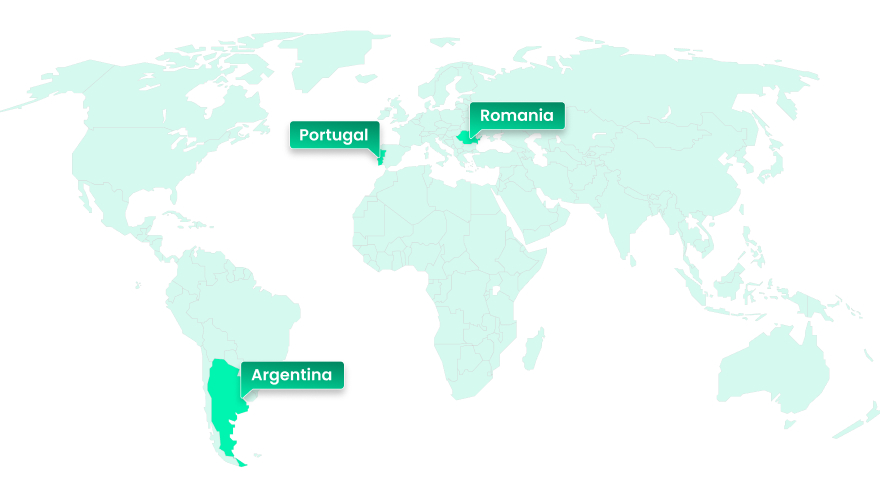
At Share IT, we take pride in offering Microsoft .NET development services and providing highly skilled .NET developers from our outsourcing development centres located in Argentina, Portugal and Romania. These countries have been carefully chosen as strategic destinations due to the wealth of talent and resources they offer.
Argentina stands out as an exceptional market for .NET development. With a large pool of skilled developers, Argentina provides an attractive combination of technical expertise and cost-effectiveness. Our talented Argentinean developers are well-versed in the latest .NET frameworks and possess a solid foundation in software development principles. Their proficiency in English and cultural alignment with Western countries ensure smooth communication and collaboration with international clients.
Portugal, on the other hand, offers a range of unique advantages. As a nearshore destination in Europe, Portugal boasts a skilled workforce of .NET developers who possess both technical excellence and proficiency in English. The country's proximity to major European cities allows for convenient travel and on-site visits, fostering stronger relationships and direct communication. Portugal's stable business environment and high-quality infrastructure further make it an outsourcing destination for .NET development projects.
Romania, known for its strong IT industry, is a valuable resource for .NET development talent. The country has gained recognition for its highly skilled professionals who excel in various software development technologies, including .NET frameworks. Romanian developers are known for their technical expertise and the ability to deliver high-quality solutions. With cost advantages compared to Western European countries, Romania offers a compelling proposition for businesses seeking skilled .NET developers at competitive rates.
Businesses can tap into these countries' unique strengths and benefits by leveraging our outsourcing centres in Argentina, Portugal, and Romania. Whether it's cost-effectiveness, technical expertise, cultural alignment, or proximity to major markets, Share IT ensures access to the right talent and resources tailored to specific development needs.
Our team of skilled .NET developers are equipped to deliver top-notch solutions while providing seamless communication, collaboration and reliable support throughout the project lifecycle.
In summary, Share IT's Microsoft .NET development services and our outsourcing centres in Argentina, Portugal and Romania offer businesses a wide range of advantages. With a large pool of skilled .NET developers available at competitive rates, companies can leverage the unique strengths of each country to find the perfect match for their specific development requirements.
Our conclusion
In conclusion, the advantages of using Microsoft .NET and hiring .NET developers are plentiful. By harnessing the power of .NET, businesses can leverage a robust and versatile framework to build a wide range of applications. The worldwide pool of .NET developers offers a vast talent pool from which to hire, ensuring access to experienced professionals with diverse skill sets.
Hiring .NET developers brings several benefits. These skilled individuals possess in-depth knowledge of the .NET ecosystem, enabling them to develop efficient, scalable, and secure applications. Their expertise in programming languages like C# and familiarity with frameworks and tools make them valuable assets for any development project.
Furthermore, the availability of .NET developers worldwide enables businesses to tap into a global talent pool. This means organizations can find and hire .NET developers from different geographical regions, offering cost, time zones, and cultural alignment flexibility. It opens up opportunities for collaboration, innovation, and the potential to assemble a high-performing development team.
The advantages of hiring .NET developers extend beyond technical expertise. They bring problem-solving skills, adaptability, and effective communication to the table. Their ability to work collaboratively and contribute to team dynamics ensures a smooth development process and successful project outcomes.
About us
Provider of software development services with offices in Toronto and Dublin, and development centres in Argentina, Portugal, and Romania. We provide software, web, and mobile development services to IT and Tech companies, IT teams, Marketing and Digital agencies and Marketing teams across Europe and North America.
Europe & North America
-
Argentina
If you operate in North America, our development centre in Argentina is an excellent location to benefit from a flexible, competitive, and scalable software development team based in a similar time zone.
-
Hybrid
If you need development teams across North America and Europe, we can offer you a hybrid software development environment from our development centres in Argentina, Portugal, and Romania.
-
Portugal & Romania
If you operate in Europe, our development centres in Portugal and Romania are great locations for you to benefit from flexible, competitive, and scalable software development teams based in similar time zones.

